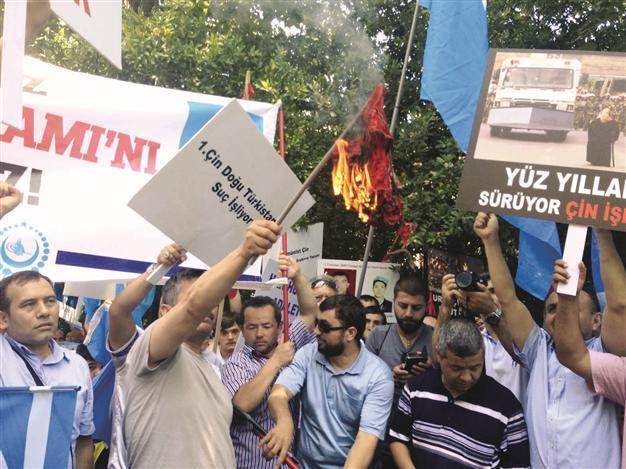Turkish civil society against brutality in ‘East Turkestan’
ANKARA

A number of protests have been staged in Turkey in recent weeks to condemn China's policies in the Uighur Autonomous Region.
Leading Turkish civil society organizations have voiced their concerns over the violation of fundamental human rights in China’s northwestern Xinjiang Uighur Autonomous Region, pledging to take the issue to international organizations and observers.
“The primary way of eliminating concerns is by connecting the region, which is excluded from the rest of the international community, particularly Yarkant, to the world again through healthy communicative channels. Within this context, the region should be opened to aid organizations and international human rights observers,” a joint statement released Aug. 20 by members of the EU-Turkey Joint Consultative Committee read.
“Turkish kin, who have been banned from living their faith, are facing pressure and violence in the Uighur Autonomous Region, which is home to more than 20 million Muslim Uighur Turks,” said Bendevi Palandöken, president of Turkey’s Tradesmen and Artisans’ Confederation (TESK), while reading the joint statement on behalf of the group at a meeting hosted by the Turkish Union of Chambers and Commodities Exchanges (TOBB).
“However, we cannot remain silent in the face of ongoing injustice and practices that do not comply with human rights. Practices in the Uighur Autonomous Region, which deny freedom of faith, have turned into brutality,” Palandöken added.
“Executions have been gradually increasing,” Palandöken said, while emphasizing that all kinds of communication channels have been closed to the region.
“We have decided to take the issues in East Turkestan and that steps should be taken to inform international organizations that we are a member of. We believe the international community will become more sensitive to the issue. We expect all segments of our society to display the same sensitivity,” he said.
In addition to the TESK president and TOBB President Rifat Hisarcıklıoğlu; Independent Industrialists and Businessmen’s Association’s (MÜSİAD) President Nail Olpak, Turkish Exporters’ Assembly (TİM) President Mehmet Büyükekşi, Confederation of Righteous Trade Unions (Hak-İş) President Mahmut Arslan, Confederation of Public Servants’ Trade Unions (Memur-Sen) President Ahmet Gündoğdu, Turkish Public Workers’ Labor Union (Kamu-Sen) President İsmail Koncuk, Turkish Confederation of Employers’ Unions (TİSK) Deputy President Erol Kiresepi, Confederation of Turkish Labor Unions (Türk-İş) President Ergün Atalay and Turkish Union of Agricultural Chambers (TZOB) Consultant Hasan Hüseyin Coşkun attended the meeting.
Palandöken said they expected developments in the Turkey-China relationship to have a positive impact in combating the tragedy that is currently occurring in the Uighur Autonomous Region.
The Chinese government has blamed a string of recent attacks in Xinjiang on Islamist militants and separatists, who it says are bent on establishing an independent state called East Turkestan.
About 100 people were killed when knife-wielding attackers staged assaults in two towns in the region’s south in late July, which lead to 59 “terrorists” being shot dead by police, state media said, while a suicide bomber killed 39 people at a market in Urumqi in May.
Rights advocates say heavy-handed policies there, including restrictions on Islam and the Uighur people’s culture and language, have contributed to the unrest.
While hundreds have died in Xinjiang in the past 18 months due to the political unrest, tight security makes it almost impossible for journalists to make independent assessments of the violence.
